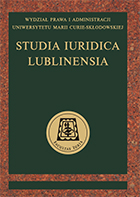Prokuratura II Rzeczypospolitej w świetle obowiązującego ustawodawstwa
The Public Prosecutor’s Office in the Second Polish Republic in Light of the Binding Legislation
Author(s): Małgorzata Materniak-PawłowskaSubject(s): History of Law, Constitutional Law, Public Administration, Interwar Period (1920 - 1939)
Published by: Wydawnictwo Naukowe Uniwersytetu Marii Curie-Sklodowskiej
Keywords: public prosecutor’s office; judicature;
Summary/Abstract: During the interwar years, the date of the 1 January 1929 constituted an important turning point for the public prosecutor’s office. Until that moment, namely between 1918 and 1928, the legislation of the prosecutor’s office was regulated by the separate legal acts of each of the previously partitioned areas of the country. This varied legal mosaic was composed of Polish and foreign regulations, older and newer regulations, and also they contained outdated as well as more modern solutions. On the other hand, uniform legal regulations were in force between 1929 and 1939. The majority of the aforementioned regulations were included in the ordinance of the President of the Polish Republic from 1929 called Law on the system of common courts. The regulations were further developed in various bylaws, especially in the rules pertaining to the functioning of the prosecutor’s office. Despite these significant differences connected with the sources of the law, the legislation of the prosecutor’s office during the entire interwar period was practically based on the same rules. The prosecutor’s office remained in close organizational connection with the courts’ structure. Furthermore, given prosecutor’s offices were functioning by their respective courts, even going as far as taking the courts’ names. The entire prosecutor’s office had one common Public Prosecutor General in the person of the Justice Minister. And the main rules connected with the functioning of the prosecutor’s office are: the principle of centralism, hierarchical subordination, uniformity, substitution, devolution and, finally, legalism.
Journal: Studia Iuridica Lublinensia
- Issue Year: 25/2016
- Issue No: 3
- Page Range: 659-674
- Page Count: 16
- Language: Polish

